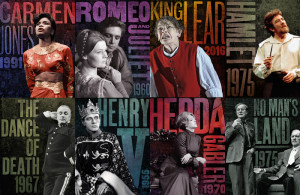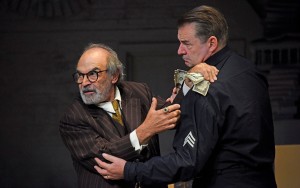The 2018-19 Broadway season, which already began with the opening of Head over Heels a few weeks ago, continued with not one but two summer musical openings in the last week: Gettin’ the Band Back Together (which will more than likely quickly disband) and Pretty Woman — the Musical, both of which I’ve reviewed (see below). Things are a lot slower in London, though there’s been an opening of at Shakespeare’s Globe; but offstage and behind-the-scenes, there’s been a number of controversies, the introduction of good practices, and even the release of theatrical stamps, and new shows plus closures announced. Here’s the week digested!
HEADLINES OF THE WEEK
*  Shows coming: the Menier Chocolate Factory has announced that its Christmas musical this year will be a new Trevor Nunn directed version of Fiddler on the Roof, from November 23 prior to an opening on December 5. As I’ve managed to miss the last three Menier shows in a row — Kiss of the Spiderwoman, The Grönholm Method and the current Spamilton — I’m looking forward to re-visiting the venue again. Interestingly, there’s also currently a hit off-Broadway revival of the same show, presented in Yiddish (photographed above), that’s just been extended through October 25 at the Museum of Jewish Heritage, and I plan to see on my October trip to NYC.
Shows coming: the Menier Chocolate Factory has announced that its Christmas musical this year will be a new Trevor Nunn directed version of Fiddler on the Roof, from November 23 prior to an opening on December 5. As I’ve managed to miss the last three Menier shows in a row — Kiss of the Spiderwoman, The Grönholm Method and the current Spamilton — I’m looking forward to re-visiting the venue again. Interestingly, there’s also currently a hit off-Broadway revival of the same show, presented in Yiddish (photographed above), that’s just been extended through October 25 at the Museum of Jewish Heritage, and I plan to see on my October trip to NYC.
* ….And shows going…. The London production of Motown the Musical has announced it is to close at the Shaftesbury on April 20, 2019, after a run of over 1,330 performances since originally opening in February 2016. On Broadway, its original run was just 738 performances, and a summer revival in 2016 mustered just 24 performances. Meanwhile, the show is also set to begin a UK national tour in October at Birmingham’s New Alexandra (full tour dates are here: https://motownthemusical.co.uk/tour/)
*  I can’t remember the last time I actually used a stamp — but now the Royal Mail are providing an incentive: to mark the 200th birthday of the Old Vic, they’re releasing a set of eight stamps featuring some the theatre’s most celebrated performances, including Judi Dench in Romeo and Juliet (1960), Richard Burton’s Henry V (1955), Albert Finney as Hamlet (1975), John Gielgud and Ralph Richardson in No Man’s Land (1975) and Glenda Jackson as King Lear (2016).
I can’t remember the last time I actually used a stamp — but now the Royal Mail are providing an incentive: to mark the 200th birthday of the Old Vic, they’re releasing a set of eight stamps featuring some the theatre’s most celebrated performances, including Judi Dench in Romeo and Juliet (1960), Richard Burton’s Henry V (1955), Albert Finney as Hamlet (1975), John Gielgud and Ralph Richardson in No Man’s Land (1975) and Glenda Jackson as King Lear (2016).
* The most welcome industry initiative of the week is the National Theatre’s incoming head of casting Alistair Coomer committing to letting actors know what the outcome of their auditions at the theatre are, instead of having to rely on silence as a sign that they’ve not secured a job. Or worse, by finding out who actually got the job instead of them: during the casting of Follies, for instance, Baz Bamigboye announced some early casting in the Daily Mail — and when I conveyed this to a friend who had been up for one of those roles, it was the first he’d heard that he’d not got it.
* Performers are also actively campaigning for understudies to be properly credited whenever they appear, in a #creditforcovers initiative, as reported by The Stage here. I’ve already written about these challenges, when several critics wrongly credited Ruthie Ann Miles for starring as Lady Thiang in the current production of The King and I when, in fact, the role was being played by the jointly billed Naoke Mori. As producer Michael Harrison has commented, “The audience deserves to know who they’re watching and the performer deserves credit. It’s worth talking about as understudies save shows – they really do. They are the lifeblood, as they keep the curtains up and the shows on. We have to find a way of doing something about it.”
* Also welcome: Ticketmaster, the world’s largest ticket broker who represent thousands of venues as their primary box office outlet, is going to stop running with the foxes and the hounds. It has announced that it shutting down its two re-sale ticketing sites, GetMeIn and Seatwave. Instead, it is to offer a new Ticketmaster ticket exchange service that will let fans sell tickets they can’t use directly through their Ticketmaster account, for the price originally paid or less. But the problem hasn’t entirely gone away: StubHub and Viagogo continue to operate.
*  The Stage Debut Awards, now in their second year, honour start-of-career actors to mark their first splashes in the industry. I am extremely proud to be on the nominating and judging committee for this, with this year’s nominees announced last Thursday; the winners will be announced at a ceremony on September 23. One category — for West End debut of the year — is decided by public vote; cast your vote here before September 16.
The Stage Debut Awards, now in their second year, honour start-of-career actors to mark their first splashes in the industry. I am extremely proud to be on the nominating and judging committee for this, with this year’s nominees announced last Thursday; the winners will be announced at a ceremony on September 23. One category — for West End debut of the year — is decided by public vote; cast your vote here before September 16.
As I stated, “The shortlist for the West End debut award offers an eclectic but electrifying set of contributions, including three Tony-winning stars in Bryan Cranston, Kelli O’Hara and Adrienne Warren, each of whom made their London debuts in the last year. It also includes an actor making his adult West End debut (John McCrea previously appeared in the West End as a child actor) and another who is already a national TV star, Poldark’s Aidan Turner. But the West End is still a destination and a kind of validation for their talents, in which they join other theatrical newcomers to this global showcase like the co-writers of The Jungle and one of its principal actors. The nominating panel acknowledge them all, now it is up to the public to decide the winner.”
* Last week 14 leading directors and playwrights, including the National’s Rufus Norris, the Royal Court’s Vicky Featherstone, Caryl Churchill and Mike Bartlett, signed a joint letter condemning the Israeli bombing and total destruction of the Said al-Mishal Culture Centre in Gaza. As they wrote, “Since its establishment in 2004, Al-Mishal served as a home for hundreds of plays, ceremonies, exhibits, musical performances and national ceremonies. It was the venue of choice for theatre companies in Gaza and a space for Gaza’s top musical acts.” And they pointed out, “We are deeply shocked that this act of destruction has not been widely reported in the British press. We support all efforts to continue Al-Mishal’s mission and the campaign for the centre’s reconstruction.”
LONDON (AND BEYOND) REVIEWS
In a quiet week for London openings, the big event was the premiere of Morgan Lloyd Malcolm’s Emilia at Shakespeare’s Globe. In a five-star rave for The Stage, JN Benjamin writes, “It is true Emilia is the subject of the piece, but Morgan’s words see each and every woman that came before Emilia, have come since her, and are yet to come, and serenades their honour.”
 Beyond London (and also far from Edinburgh), Bath’s Theatre Royal summer summer saw Jonathan Church revive Arthur Miller’s The Price with a cast led by David Suchet (pictured with Brendan Coyle), earning a five-star review from Dominic Cavendish in the Daily Telegraph: “Undervalued at its 1968 premiere and underappreciated since then, Arthur Miller’s The Price stands confirmed, in Jonathan Church’s exemplary revival at Bath, as one of the most richly affecting plays ever written about family resentment and the corrosive business of determining who gave what, who got what, who’s owed what, and who decides what’s fair.”
Beyond London (and also far from Edinburgh), Bath’s Theatre Royal summer summer saw Jonathan Church revive Arthur Miller’s The Price with a cast led by David Suchet (pictured with Brendan Coyle), earning a five-star review from Dominic Cavendish in the Daily Telegraph: “Undervalued at its 1968 premiere and underappreciated since then, Arthur Miller’s The Price stands confirmed, in Jonathan Church’s exemplary revival at Bath, as one of the most richly affecting plays ever written about family resentment and the corrosive business of determining who gave what, who got what, who’s owed what, and who decides what’s fair.”
NEW YORK REVIEWS
Last week saw two Broadway musical openings: Gettin’ the Band Back Together, first tried out at New Jersey’s George Street Playhouse in 2013, arrived at the Belasco, opening on August 13, while Pretty Woman came to the Nederlander, direct from a Chicago try-out, to open on August 16.
 Gettin’ the Band Back Together was trumpeted — in a nightly scripted onstage introduction by lead producer Ken Davenport– as that rare thing: an entirely original musical. His pre-curtain speech got a lot of critical attention: as Jesse Green drily commented in the New York Times, “When a Broadway show needs a preshow warm-up, what follows is likely half-baked.” And Adam Feldman adds in Time Out New York, “You can smell the flop sweat before Gettin’ the Band Back Together even begins, as Ken Davenport—the show’s lead producer and also, not coincidentally, its principal author—takes the stage with a handheld mic to deliver a curtain speech. ‘What you’re about to see is one of those rare things on Broadway these days: a totally original musical,’ he claims. But although the show is not based on any single preexisting souce, it is, in fact, supremely unoriginal, from its formulaic ’90s-movie plot to its instantly forgettable ’80s-rock score. A community-theater vanity production that has somehow surfaced at a Broadway house, it is schlocky at every turn.”
Gettin’ the Band Back Together was trumpeted — in a nightly scripted onstage introduction by lead producer Ken Davenport– as that rare thing: an entirely original musical. His pre-curtain speech got a lot of critical attention: as Jesse Green drily commented in the New York Times, “When a Broadway show needs a preshow warm-up, what follows is likely half-baked.” And Adam Feldman adds in Time Out New York, “You can smell the flop sweat before Gettin’ the Band Back Together even begins, as Ken Davenport—the show’s lead producer and also, not coincidentally, its principal author—takes the stage with a handheld mic to deliver a curtain speech. ‘What you’re about to see is one of those rare things on Broadway these days: a totally original musical,’ he claims. But although the show is not based on any single preexisting souce, it is, in fact, supremely unoriginal, from its formulaic ’90s-movie plot to its instantly forgettable ’80s-rock score. A community-theater vanity production that has somehow surfaced at a Broadway house, it is schlocky at every turn.”
In my own review for The Stage, I pointed out another misfiring marketing initiative by Davenport: “It turns out that Davenport’s most innovative touch is not as co-writer of his own production, but in conscripting the entire town of Sayreville as co-producers. This will create a kind of alternative form of crowdfunding should they all buy tickets at Broadway prices for the show that bears their name. It doesn’t, however, do them proud.”
One intriguing coincidence: with The Band’s Visit (this year’s Tony winning Best Musical) and (until last weekend) The Boys in the Band also playing on Broadway, Gettin’ the Band Back Together made three shows on Broadway at the same time with the word Band in the title. This one, however, could be retitled The Boys in the Bland Band.
 Pretty Woman – the Musical, got a far more mixed reaction, varying from one-star in The Guardian (in a review that was headlined “a tasteless disaster”) to four stars in The Daily Telegraph and myself in The Stage. In the Chicago Tribune, Chris Jones gave the best critical appraisal of its commercial chances: “This is a populist, romantic, modestly scaled show aimed squarely at offering a fun night out for Broadway’s most lucrative demographic: women old enough to remember the 1990 film, which has grossed nearly half a billion bucks worldwide. Who would not want a piece of that brand?… Ka-ching, I suspect, whatever any of those snobbier critics might think…. The show hardly is advancing the art in any kind of profound way or challenging the film’s base. Not at all. But it clearly pleases an audience that wants to escape from the rudeness of our current discourse.”
Pretty Woman – the Musical, got a far more mixed reaction, varying from one-star in The Guardian (in a review that was headlined “a tasteless disaster”) to four stars in The Daily Telegraph and myself in The Stage. In the Chicago Tribune, Chris Jones gave the best critical appraisal of its commercial chances: “This is a populist, romantic, modestly scaled show aimed squarely at offering a fun night out for Broadway’s most lucrative demographic: women old enough to remember the 1990 film, which has grossed nearly half a billion bucks worldwide. Who would not want a piece of that brand?… Ka-ching, I suspect, whatever any of those snobbier critics might think…. The show hardly is advancing the art in any kind of profound way or challenging the film’s base. Not at all. But it clearly pleases an audience that wants to escape from the rudeness of our current discourse.”
EDINBURGH
Saturation coverage of the Edinburgh fringe continues — and keeping up-to-date with it all but impossible. There may be too many shows in Edinburgh — but there are also far too many critics trying to make sense of it all. I find myself instead relying on a narrow range of curated voices — in The Stage, Lyn Gardner writes a regular column that covers a range of fringe issues (from the useful word-of-mouth that can be gleaned from queues to the responsibility of critics and the theatre industry to search out new talent at other times of the year, too, and not just rely on Edinburgh as the place to find it, and The Stage is also, once again, proving to the single busiest reviews site in Edinburgh, along with Edinburgh daily newspaper The Scotsman.
For the broadest range of critical coverage, you could do worse than simply rely on those two outlets. Even there critics can get carried away with extreme hyperbole to make their reviews stand out from the rest. With over 3,500 shows on the fringe, I found it particularly bizarre for one critic to assert that one show he’d seen “might just be the funniest show of the festival” (in a review published just five days into the festival), and in another review of the Paines Plough Roundabout company’s season that “this year is exceptional, but there’s nothing better there – maybe nothing better at the whole festival – than Ed Edwards’ The Political History of Smack and Crack”. Unless and until he’s seen every show in the festival, these assertions are just meaningless fodder for the posters.
But you also need to go off-piste, too, and just as its useful to cast a critical net beyond the big five venues (Traverse, Assembly, Pleasance, Gilded Balloon and Underbelly), I also try to read a little more widely, too.
And some of Edinburgh’s biggest issues are occurring outside the parameters of the shows themselves. For instance, a report from the Fringe Fair Campaign found that some venues are forcing workers — whom they call ‘volunteers’ — into unfair and unsafe conditions.
It reported that these “volunteers are not paid an hourly wage, but are instead provided with free accommodation and some spending money. C venues offers a mere £200 for volunteers who work over the entire course of the Fringe, working out to less than 50p per hour. “This equates to the wages of the sweatshop,” says the report.”
I’ve previously committed myself to not review shows that do not pay their actors according to the fringe agreement. At Edinburgh, the knot gets even more tangled with venues run themselves largely on this so-called volunteer labour — a practice that also pertains at Shakespeare’s Globe in London with most of its front-of-house staff.
CONTROVERSY OF THE WEEK
 Last week Brian May waded into the story over Mazz Murray — pictured right, who had spent 8 years headlining his Queen musical We Will Rock You in the West End as the Killer Queen – -apparently being ‘banned’ from signing ‘And I’m Telling You I’m not Going’ from Dreamgirls in a Best of the West End concert at the Royal Albert Hall on October 8. May wrote, “When the producers of the Albert Hall show asked for permission for Mazz to sing the song, they were told that Dreamgirls is an “African American Musical” and they did not think it appropriate for a non-BAME company to perform the songs from it. So Mazz has been denied permission to sing the song because she’s not black.”
Last week Brian May waded into the story over Mazz Murray — pictured right, who had spent 8 years headlining his Queen musical We Will Rock You in the West End as the Killer Queen – -apparently being ‘banned’ from signing ‘And I’m Telling You I’m not Going’ from Dreamgirls in a Best of the West End concert at the Royal Albert Hall on October 8. May wrote, “When the producers of the Albert Hall show asked for permission for Mazz to sing the song, they were told that Dreamgirls is an “African American Musical” and they did not think it appropriate for a non-BAME company to perform the songs from it. So Mazz has been denied permission to sing the song because she’s not black.”
Actually, it’s not nearly as simple as that. As The Stage reported when this concert was first announced, it was notable that the original billing of stars scheduled to appear featured 11 performers — all of them white only.
Although the producers stated that more names would be announced in due course that represented a more diverse cast, none have been yet forthcoming. And a tweet of a planning meeting of the producers and cast revealed a similar lack of diversity around the table.
INTERVIEW OF THE WEEK
 Long-term Broadway understudy Stephen Payne (right) has finally stepped up to a lead role. Over 30 years ago, he first walked across a Broadway stage when he was moving a piano into place there in his then day-job: as the New York Times reported last week in an interview with him, “Before I die,” he remembered thinking, “there’s only one thing I really care about: I’d just love to own a part on Broadway.” He just got his wish — days short of his 70th birthday — when he stepped up from understudy to play the role of the patriarch to the three title characters in the current Straight White Men, when first Tom Skerritt left the show, and then his replacement Denis Arndt also did.
Long-term Broadway understudy Stephen Payne (right) has finally stepped up to a lead role. Over 30 years ago, he first walked across a Broadway stage when he was moving a piano into place there in his then day-job: as the New York Times reported last week in an interview with him, “Before I die,” he remembered thinking, “there’s only one thing I really care about: I’d just love to own a part on Broadway.” He just got his wish — days short of his 70th birthday — when he stepped up from understudy to play the role of the patriarch to the three title characters in the current Straight White Men, when first Tom Skerritt left the show, and then his replacement Denis Arndt also did.
The cast were taken to his dressing room to give him the good news. As the New York Times reported, “At first Mr. Payne thought he was being fired, but then Ms. Shapiro told him he had the role and “the boys” brought out cigars. Mr. Payne wept. He wept again as he told the story weeks later: “It was embarrassing. Even after they left, I wept in the dressing room for an hour.”
Josh Charles, who plays his middle son, broke down, too. “Seeing how much the role meant to him made me realize just how lucky we are to get to do this work,” he said.”
And how has the experience been for him? “Greater joy I have never had. Maybe when my daughter was born or you know, when I got married. But yeah.”

